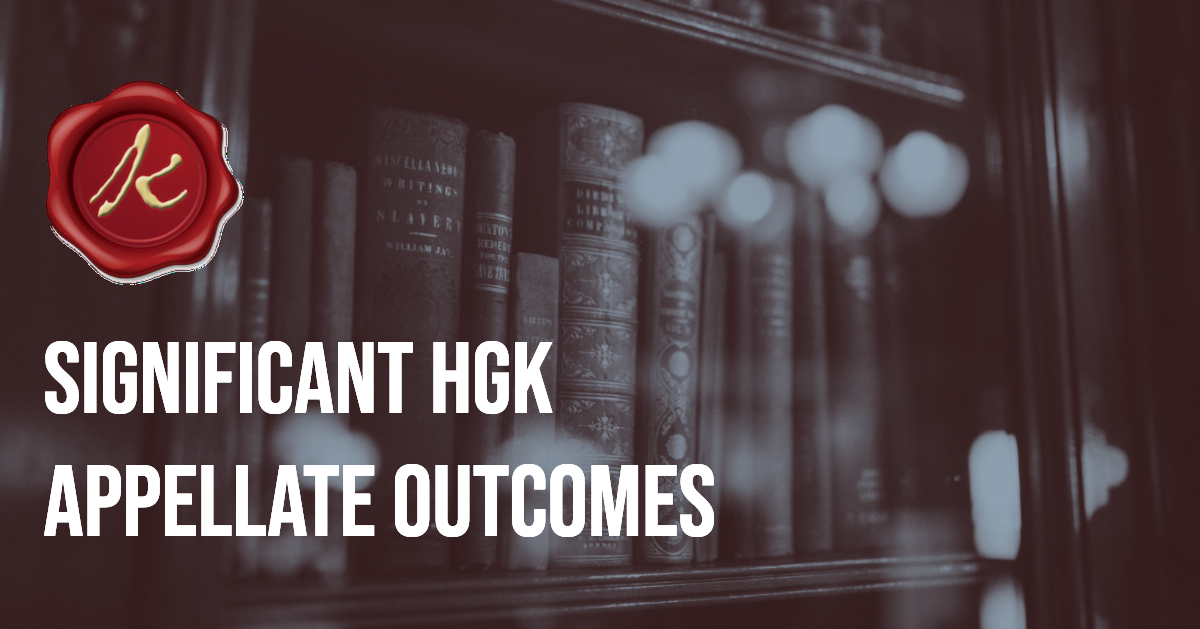
July, 2019 Update; Two Significant HGK Appellate Outcomes Have Become Final
(1) Controverted paraplegia injury claim: independent contractor or employee? Extremely close "all or nothing" question touching all elements under both ‘alternative’ statutory tests for independent contractor status. (F.S.440.02(15)(d)1a(II), AND (VI) AND F.S.440.02(15)(d)1b(IV)! Platt Jr. v. Four Fountains, Inc. and PMA Companies, 1st DCA Case No. 1D18-2570, June 26, 2019.
The Facts/Overview: E/C denied compensability after Claimant fell from a ladder propped against a tall tree, unsecured, while attempting to trim hurricane damage -- with a chainsaw: foolishness of attempting this (especially with chainsaw) without having secured the ladder "this time" was admitted, but as this is Workers’ Compensation, that was not the issue. Rather: E/C acknowledged in its brief this hapless claimant may have occupied the lowest rung on the "independent contractor" ladder (no pun intended then or now), but he nevertheless signaled by "most" of his substantive actions and agreements having been perfectly content to function as an independent contractor.
The question was admittedly close (e.g., Claimant had no regular business name, etc., and his go-between who recruited him for work that he didn't do, on behalf of the condo association, supplied ‘most’ tools), but: principal indicia of statutory independent contractor were present (e.g., he generally made his own hours, could work other projects, and supplied the single tool, hacksaw, he used 90% of the time). The JCC ruled for E/C and claimant appealed.
The Appeal and Outcome: Claimant secured one of the five or so best WC claimant appellate attorneys, esteemed Bill McCabe, who raised several provocative issues including possible statutory employment but in a "PCA" decision (no written opinion), HGK prevailed on appeal on all points, on behalf of esteemed client PMA Companies and its insured: case successfully defended at trial by Sal A. Richardson, Managing Partner for Litigation, Testan Law.
Bottom Line: in an all-out "independent contractor or not" case, every possible fact on the ground must be marshaled through discovery, examined carefully (some taking on greater significance viewed in the context of the whole, later on), and all of the ones that count then made part of the record. Indeed, there were factoids I perceived to be of great value, picked out of the sea of facts in the record, that were not given that much emphasis in trial. But of course, and to the credit of the E/C ‘s trial attorney, they were in the record. It is not uncommon for an appellate attorney to visualize a few simple steps that might have made the difference below and succumb to the temptation of arguing them on appeal, only to be wrist-slapped by the DCA for arguing things not put before the JCC with such clarity. It is indeed team effort, and credit also goes to the carrier who took the sobering step of denying an injury-claim involving paraplegia and backing it up, having secured a first-class defense and appellate posture.
HGK Notes: As signaled in my mail-out, this was an "all or nothing" question touching all elements under both ‘alternative’ statutory tests for independent contractor status. (F.S.440.02(15)(d)1a(II), AND (VI) AND F.S.440.02(15)(d)1b(IV)!). Somewhat paradoxically, there are few if any relevant, guiding cases under the new configuration of the law and an opinion here would have been helpful going forward. This was also the case in another HGK outcome reported earlier this year (i.e., PCA in independent contractor case where opinion would have been helpful to Bench, Bar and litigants).
The ancient ‘mystery’ concerning on the one hand, desire by most if not all appellate attorneys to have an opinion win or lose -- and the basis the court chooses for writing or not, continues unabated, but it would be a good time to have a new judicial expression on this often vexatious issue. Then again, in casual remarks at conferences, some judges subtly suggest attorneys "should be careful what they wish for," in terms of what an opinion might have implied and I'm sure that is on occasion quite true (gulp!) – – but -- the undersigned defended a challenge to a JCC denial of a mold case (brought again by one of the top five claimant's appellate counsel and the very first under the then-new mold law), which was selected by the court as a demonstration oral argument held live before the University of Miami law school; E/C even admitted presence of some mold and initiated remediation but disputed claimant suffered from that strain – – i.e. as close as it gets, but the court issued a PCA (E/C prevailed). Go figure!
(2) Multiple issues and cross-appeal including; (a), employee status denied by both construction-site carriers; (b), responsibility for over $400,000 in medical bills disputed on technical grounds (i.e., apart fromemployee status) and; (c), method for awarding temporary indemnity benefits which continue through date of hearing.
The Facts/Overview: In an admittedly unusual arrangement, a general contractor brought in a sub with the contractual requirement that the sub hire certain employees, including claimant, determined by the general who were not otherwise known to the principle for the subcontractor at the time, along with myriad other unusual facts. Nevertheless, the principle for the sub agreed and agreed at trial that all was in order. Claimant was injured and the sub's carrier denied claimant was an employee of the sub: the general also denied the claim. Citing too many irregularities to list, the JCC ruled claimant was an employee of the general and not the sub. The JCC awarded temporary indemnity to the date of hearing.
However, while awarding some bills, the JCC denied the vast majority (some $400,000) in medical bills on what can be described as technical grounds.
The general through its carrier appealed determination claimant was its employee – – and claimant cross-appealed, employing again one of the top five or so Florida claimant appellate attorneys, Wendy S. Loquasto, challenging both denial of medical bills and manner by which JCC awarded indemnity only through date of hearing.
The appeal and outcome: Mixed result: in a published opinion, HGK, representing the general, did not prevail in challenge to JCC determination of employee status, however, HGK successfully defended, on behalf of esteemed client Summit/Bridgefield Employers Insurance Company, Claimant’s Cross-appeal challenging JCC denial of the substantial medical bills on technical grounds, as well as JCC’s method of ordering continuing benefits.
However, this latter ruling regarding construction of the decretal portion of an order included a rare instance in which First DCA quoted with approval an extended excerpt from HGK’s Cross-Answer Brief (with page citation to brief) -- a most gratifying thing for a practitioner to see within a published opinion. That segment of the court's opinion is reproduced here:
“Indeed, as the E/C recognizes,1 even without such language, the self-executing nature of the workers' compensation system will require the E/C to continue providing TTD benefits to Claimant so long as he remains eligible for those benefits, and if the E/C fails to do so, Claimant is not without recourse. Thus, under the circumstances, the language Claimant asks us to add to the JCC's order is surplusage.
1See Reply/Cross-Ans. Br. at 47-48 (“Salutary phrases emerged in the case law, such as those Claimant cites and would like to have seen written into the order, e.g.; ‘until such time’ or ‘for so long as such benefits are proper’ -- all ways of simply signaling a case is returned to a self-administering status, it being presumed the carrier will not act arbitrarily but will continue benefits until such date as a release is published, for if it acts precipitously -- or even if it acts responsibly, definitive report in hand: in both cases a claimant is not precluded from challenging administrative determination vis-à-vis all tools and remedies afforded by law for continuation or extension of said benefits, along with fees, costs, penalties and interest designed to keep the carrier on the straight-and-narrow.”). “
Bottom line: it is important not to lose sight of "all" the issues when one seems to predominate, e.g., in this case, compensability itself! Those medical bills might have equaled or exceeded the value of the underlying indemnity claim, and defense counsel did an exceptional job in blocking them on purely technical grounds, employing classic trial skills on what could easily have doubled or tripled the value of the award. This significant trial achievement was preserved on appeal and helped create a decidedly "good news bad news" ring to the outcome. This complex and unique case was ably defended at trial level by Daniel J Simpson, Partner, Testan Law. Addison Drywall, Inc. v. Torres, 270 So. 3d 440, 441 (Fla. Dist. Ct. App. 2019)


